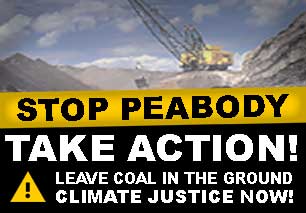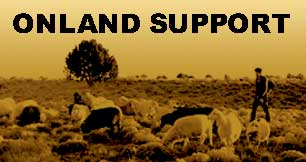Urgent Action Needed Now
December 13, 2006 by pathfinder
Filed under Archives
SUPPORT COMMUNITIES IN STOPPING
MASSIVE COAL MINING EXPANSION PLANS.
SUMMARY:
Massive mining plans underway at Black Mesa, Arizona have serious
environmental, social, and human rights impacts. Send a letter today to
the Office Of Surface Mining, asking them to extend the critical deadline
to allow impacted communities adequate time to prepare their input on
stopping a destructive coal mining project.
BACKGROUND:
Peabody Western Coal, the world’s largest coal company, has plans to
extend its mining operations on Black Mesa and has filed a lease extension
application with the federal Office of Surface Mining (OSM). Peabody plans
to obtain a ‘Life of Mine’ permit -which means it would be permitted to
continue its unsustainable and dirty coal mining practices until all of
the coal is removed!
To transport the coal, the company plans on continuing its practice of
taking billions of gallons of water a year from the only water sources in
the area, drawing down both high quality, residential water aquifers:
Navajo Aquifer and Coconino Aquifer. These developments threaten the
viability of the region’s primary water source.
Plans include relocating at least 17 families.
The passage of these plans would effectively devastate the Navajo, or
Dineh, and Hopi peoples. Indigenous communities live on the land above the
water and billions of tons of low-sulfur coal. As with their ancestors,
many generations back, the Black Mesa peoples live on the land that is the
base for their tradition, their spirituality, their water and their
livelihood. Peabody’s coalmine expansion could also impact numerous
archaeological, historical, and traditional cultural resources.
It’s difficult to convey the serious nature of these new developments. The
passage of these plans would effectively devastate the Navajo, or
Dineh, and Hopi peoples, stripping them of their identity and way of life
which is tied into the land itself. Peabody’s coalmine expansion could
also impact numerous archaeological, historical, and traditional cultural
resources.
JOIN US IN REQUESTING AN EXTENSION OF THE PUBLIC COMMENT PERIODS, SO THAT
AFFECTED FAMILIES CAN PREPARE A COMPREHENSIVE RESPONSE!
The Office of Surface Mining (OSM) is holding public hearings for comments
on the Draft Environmental Impact Statement for the Black Mesa Project
starting January 2nd. This is not enough time for families to prepare
comments on the 758 page, technical report. OSM must take the
testimonies from the public hearings into consideration in preparation for
the final EIS. OSM also requires that comments reference specific
paragraphs and pages within this report. A summary of this report is
supposed to be presented in Dineh but how much specific information
that is also included in the draft EIS is not known.
OSM is not taking into account the time of year set for the comments
on the Draft EIS. For traditional Hopi, it is a time of intense
ceremony; they cannot take part in any other activities until March.
Also, at this particular time of year, the unmaintained roads are often
impassable on Black Mesa because of adverse weather conditions, making it
impossible for residents to attend the different meeting locations to make
their comments and/or to be able to mail their comments. Furthermore, it
is questionable if and when the communities of the Black Mesa received
this report.
All these barriers make it difficult for comments to be made by the
impacted communities and from the public in general.
Because some families face relocation should Peabody’s request for the
lease be adopted, and because the environmental impacts are complex, it is
only equitable to allow the impacted communities enough time to comprehend
all that is found in this extensive report.
In the meantime, grassroots groups are in the process of analyzing this
extensive Environmental Impact Statement. These hearings are critical—not
only to the lives of the traditional communities who reside and depend on
Black Mesa—but for all beings who breathe and live on this planet which is
overburdened by mining corporations destroying the planet. Burning coal
produces a significant amount of carbon dioxide and other elements which
are tied to acid rain and smog, and has been linked to global warming. The
energy that is made from Black Mesa coal goes to major towns and cities
throughout the southwest, including Los Angeles Las Vegas.
This report can be found at: http://www.wrcc.osmre.gov/WR/BlackMesaEIS.htm
NOW IS THE TIME TO ACT BEFORE THESE PLANS GET APPROVED!
Please send a letter to OSM today and ask your friends and family to do
the same. If you can mail it in, please do so now.
————-
A FEW REASONS TO OPPOSE COAL USE:
*Coal is dirty. Taking it out of the earth is ruining the land and the
people who live nearby have lung problems. Coal-fired power plants emit
more hazardous air pollution than any other industry, including more than
60 different toxic chemicals.
*There are alternatives and it is up to us the people to use them. (Learn
more about the Just Transition Plan. See Black Mesa Water Coalition’s
website – http://www.blackmesawatercoalition.org/index.html)
* According to Peabody Energy, the company believes that “coal is the
future,” aiding in “Global Solutions to Global Needs,” and plans on
expanding their coal production globally. (Peabody has recently secured
deals in China.) The Dineh residents near the mine are living in fear that
they will be relocated and that the whole Black Mesa area will be forever
lost to more mining and to coal-fired energy plants.
* According to many of the traditional indigenous communities on Black
Mesa, the coal is the Mother Earth’s liver and should not be removed.
*The history of forced relocation of indigenous families from their
homeland for energy interests is another act of environmental racism.
*Our lives are interconnected to what happens to Black Mesa because many
of us use and benefit off the energy produced. It is our duty to act.
——————————————————————–
Sample Letter:
———————————-
Dennis Winterringer
Western Regional Office
Office of Surface Mining and Encorcement
P.O. Box 46667
Denver, CO 80201-6667
Phone: 303-844-1400, ext. 1440
email: bmkeis@osmre.gov
RE: Request for Extension to Submit Oral and Written Comments on Black
Mesa Project Draft Environmental Impact Statement
Dear Mr. Winterringer:
The purpose of this letter is to request that OSM grant a sixty-day
extension for both oral and written comments on the Black Mesa Project
Draft Environmental Impact Statement.
There are several reasons why this extension should be granted. First,
this 758 page Draft Environmental Statement (DEIS) is extremely complex,
covering many important issues in depth which requires more time to read
through and digest. These issues include mining operations, hydrological
impacts of water withdrawals, and the construction and impacts of a coal
slurry.
Due to the scope and complexity of the issues, the present schedule of the
public comment periods do not allot enough time for the public to prepare
comprehensive comments to address their concerns about the many important
issues presented in the DEIS. It is of the utmost importance that the
impacted communities be provided with this extension to review this
complex document. It is they who will have to live with the consequences
should Peabody’s “Life-Of-Mine” lease be granted. Therefore, their
comments are of paramount importance.
Second, at this particular time of year, the unmaintained roads are often
impassable on Black Mesa because of adverse weather conditions, making it
impossible for residents to attend the different meeting locations to make
their comments and/or to be able to mail their comments. As you remember,
this was the case during the Scoping Hearings in 2005, and meetings needed
to be rescheduled.
Third, the timing and nature of the release will prevent participation by
many tribal members. The Hopi yearly calendar involves a complex
ceremonial cycle that requires times of intense meditation and ceremonial
isolation for Hopi citizens. The current schedule of the public comment
periods take place during their ceremonial cycle, that prohibits them from
participating in any activities such as public hearings and meetings.
This cycle goes through February. Not extending the comment period
deadline will prevent participation from tribal members and shows blatant
disregard for the religious beliefs of the Hopi.
Finally, it is questionable if any of the Dineh and Hopi peoples living in
the impacted communities received the DEIS, or know of its existence.
Both Dineh and Hopi peoples are important stakeholders who must be given
the opportunity to express their views.
It is only equitable that you keep in mind the needs of the peoples living
in the impacted communities, and allow this extension. Anything less
would be considered not only a violation of human rights but as another
example of environmental racism.
For these reasons, we strongly urge you to extend the comment period.
Thank you very much for your consideration of this matter.
Sincerely,


